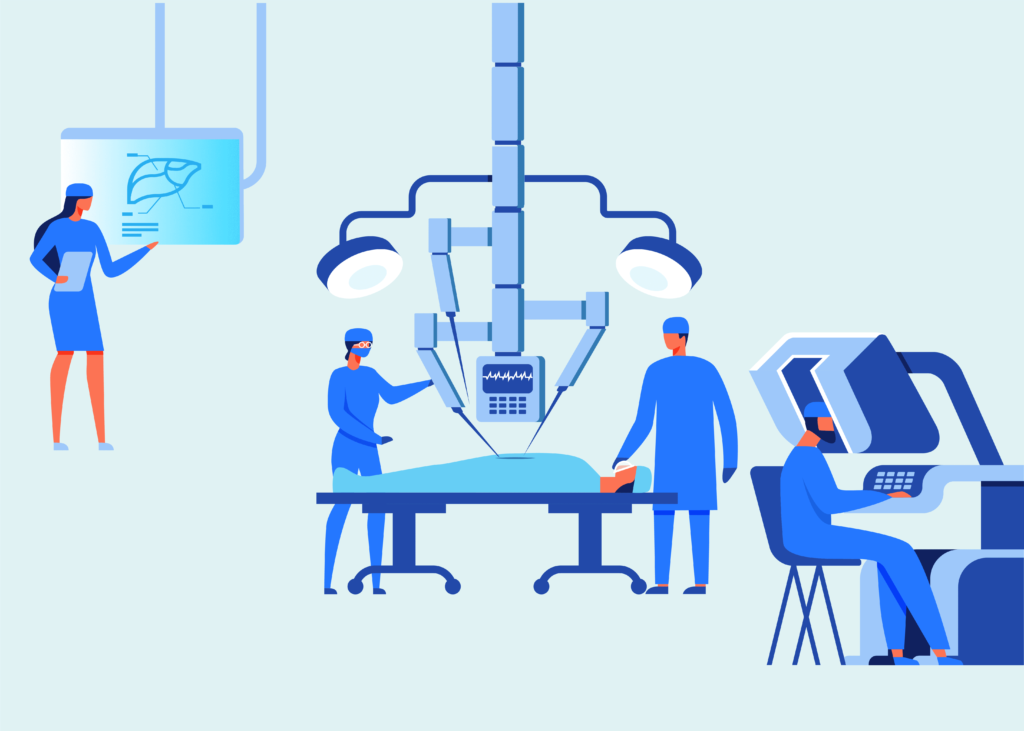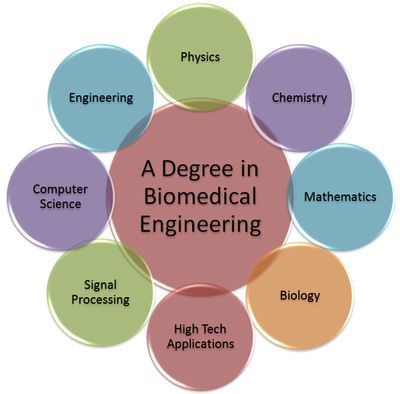Biomedical engineering is a multidisciplinary field that merges principles of engineering, biology, and medicine to develop innovative solutions and technologies for advancing healthcare. With its unwavering focus on improving patient care, biomedical engineering plays a pivotal role in bridging the gap between medicine and technology.
- Role of Biomedical Engineers
- Educational Prerequisites for Biomedical Engineering
- High School Curriculum
- Top Universities Programs in India and Overseas
- Recommended Extracurricular Activities
- Real World Applications and Innovations
- Internship and Research Programs
- Essential Skills for Career Advancement to Excel in Biomedical Engineering
- Student Memberships in Biomedical Engineering Organizations
- Average Salary for Biomedical Engineers
- Stay Updated with Notable Advancements and Breakthroughs in Biomedical Engineering
- Recommended Resources to Learn Biomedical Engineering
- Summary
- Frequently Asked Questions
Role of Biomedical Engineers
Biomedical engineering is a fascinating field that combines principles of engineering, biology, and medicine to develop innovative solutions for healthcare. Biomedical engineers are vital in designing, creating, and maintaining medical equipment and technologies used in diagnosis, treatment, and rehabilitation. They collaborate with healthcare professionals to understand their needs and develop cutting-edge devices, prosthetics, implants, and imaging systems. Additionally, biomedical engineers conduct research, analyze data, and contribute to advancements in fields like tissue engineering, genetic engineering, and medical imaging. Their work improves patient care, enhances medical procedures, and saves lives. With a diverse skill set, biomedical engineers are at the forefront of technological advancements in healthcare.
Educational Prerequisites for Biomedical Engineering
To become a biomedical engineer, you need to fulfill certain educational requirements. Typically, a bachelor’s degree in biomedical engineering or a related field is necessary. These programs cover a range of subjects, including biology, chemistry, physics, mathematics, and engineering principles. Some universities also offer specialized biomedical engineering programs. Additionally, pursuing a master’s or doctoral degree in biomedical engineering can provide further specialization and research opportunities. Gaining practical experience through internships, co-op programs, or research projects is highly beneficial. It’s essential to choose accredited programs and institutions recognized for their quality biomedical engineering education. Admissions requirements vary, but they often include a strong academic record, standardized test scores, letters of recommendation, and a personal statement outlining your interest in the field.
High School Curriculum
To prepare for a career in biomedical engineering during high school, it is advisable to focus on specific subjects that build a strong foundation for this field. Science related subjects such as biology, chemistry, and physics are crucial as they provide essential knowledge about the human body, chemical reactions, and physical principles. Mathematics, including algebra, geometry, and calculus, is also essential for understanding the quantitative aspects of engineering. Additionally, taking advanced science and math courses can demonstrate your dedication and readiness for a biomedical engineering program.
Developing skills in computer science and programming is valuable, as biomedical engineering heavily relies on technology and software applications. Engaging in extracurricular activities like science clubs, robotics teams, and research projects can also enhance your understanding and passion for the field.
Top Universities Programs in India and Overseas
Information on universities and colleges in India and abroad that offer reputable programs in biomedical engineering.
| Location | Universities/Colleges |
|---|---|
| India | IIT Delhi, Delhi Technological University (DTU) |
| IIT Bombay, VIT University | |
| Birla Institute of Technology and Science (BITS) | |
| SRM Institute of Science and Technology | |
| Manipal Institute of Technology | |
| Amrita School of Engineering | |
| PSG College of Technology | |
| Thapar Institute of Engineering and Technology | |
| SASTRA Deemed University | |
| Abroad | Massachusetts Institute of Technology (MIT), USA |
| Stanford University, USA | |
| University of California, San Diego (UCSD), USA | |
| Imperial College London, UK | |
| University of Oxford, UK | |
| ETH Zurich, Switzerland | |
| University of Toronto, Canada | |
| University of Sydney, Australia | |
| National University of Singapore, Singapore |
Please note that this is not an exhaustive list, and there are many other excellent universities and colleges both in India and abroad that offer biomedical engineering programs. It’s essential to thoroughly research and consider factors such as curriculum, faculty, research opportunities, and reputation before making a decision.
Recommended Extracurricular Activities
Engaging in specific extracurricular activities or joining clubs related to biomedical engineering can indeed enhance your chances of getting into a good program. Here are some examples:
- Science Olympiad: Participate in science competitions or Olympiads that focus on biology, chemistry, or physics. These competitions demonstrate your knowledge and passion for scientific subjects.
- Robotics Club: Join a robotics club or team where you can work on building and programming robots. This will develop your engineering and problem-solving skills, which are crucial in biomedical engineering.
- Science Fair: Participate in science fairs and showcase projects related to biomedical engineering. This allows you to conduct independent research and demonstrate your practical application of scientific concepts.
- STEM Outreach Programs: Get involved in STEM outreach programs where you can mentor or teach science related subjects to younger students. This demonstrates leadership, communication skills, and a commitment to promoting science education.
- Biomedical Engineering Society (BMES): Join your school’s or local chapter of BMES, which is a professional organization dedicated to biomedical engineering. It provides networking opportunities, access to resources, and exposure to the latest advancements in the field.
- Research Projects: Seek opportunities to work on research projects related to biomedical engineering, either through internships, summer programs, or collaborations with professors. Research experience showcases your ability to conduct scientific investigations and contribute to the field.
- Volunteering at Healthcare Facilities: Consider volunteering at hospitals, clinics, or healthcare centers to gain exposure to the healthcare environment. This demonstrates your interest in the field and provides valuable insights into patient care.
- Coding or Programming Clubs: Join coding or programming clubs where you can develop skills in software development, data analysis, or computational modeling. These skills are increasingly important in biomedical engineering.
Remember, the key is to pursue extracurricular activities that align with your interests and passion for biomedical engineering. Admissions committees value the depth of involvement and dedication to specific activities rather than just quantity.
Real World Applications and Innovations
Here are some examples of real-world applications of biomedical engineering:
- Medical Imaging: Biomedical engineers contribute to the development of imaging technologies such as X-ray, MRI, CT scan, ultrasound, and PET scan. These imaging techniques aid in the diagnosis and monitoring of various medical conditions.
- Prosthetics and Orthotics: Biomedical engineers design and create prosthetic limbs, orthotic devices, and assistive technologies to enhance mobility and improve the quality of life for individuals with limb loss or physical disabilities.
- Biomedical Instrumentation: Biomedical engineers develop and maintain medical instruments and devices used in hospitals and clinics, such as heart monitors, blood pressure monitors, electrocardiography (ECG) machines, and anesthesia machines.
- Biomaterials and Tissue Engineering: Biomedical engineers work on developing biocompatible materials and scaffolds for tissue engineering applications. This includes artificial organs, bone grafts, skin substitutes, and drug delivery systems.
- Medical Robotics and Surgical Assistants: Biomedical engineers contribute to the design and development of robotic surgical systems, surgical simulators, and robotic prosthetics to assist surgeons in performing minimally invasive procedures with improved precision.
- Rehabilitation Engineering: Biomedical engineers develop technologies and devices for physical therapy and rehabilitation, including robotic exoskeletons, prosthetic control systems, and assistive technologies for individuals with disabilities.
- Biomedical Data Analysis: Biomedical engineers apply computational methods and data analysis techniques to study large-scale biological and medical datasets, leading to advancements in personalized medicine, genomics, and disease diagnostics.
- Biomechanics: Biomedical engineers study the mechanics of the human body to understand movement, muscle function, and injury mechanisms. This knowledge helps in designing ergonomic equipment, sports equipment, and rehabilitation devices.
- Neural Engineering: Biomedical engineers work on developing technologies such as brain-computer interfaces (BCIs), deep brain stimulation, and neuroprosthetics to restore sensory and motor functions in individuals with neurological disorders.
- Health Informatics: Biomedical engineers contribute to the development of healthcare information systems, electronic medical records, and telemedicine technologies that enable efficient storage, retrieval, and sharing of patient data for improved healthcare delivery.
These are just a few examples, and biomedical engineering continues to expand its applications across various domains, contributing to advancements in healthcare and improving the quality of life for individuals worldwide.
Internship and Research Programs
Here are some internships and research opportunities available for high school students interested in biomedical engineering in India and abroad:
In India:
- IIT Kharagpur Young Innovators Program: This program offers research internships for high school students in various fields, including biomedical engineering.
- IIT Bombay Student Research Internship Program: High school students can apply for research internships at IIT Bombay in areas such as biomedical devices, imaging, and biomaterials.
- AIIMS Student Research Internship Program: All India Institute of Medical Sciences (AIIMS) offers short-term research internships for high school students interested in biomedical research.
- National Brain Research Centre (NBRC) Summer Research Program: NBRC offers a summer internship program for students interested in neuroscience and related fields, including biomedical engineering.
- Amrita School of Engineering Summer Internship Program: Amrita School of Engineering provides summer internships for high school students in biomedical engineering and related areas.
Abroad:
- MIT Introduction to Biomedical Engineering: MIT offers a summer program called Introduction to Biomedical Engineering, where high school students can learn about the field through lectures, lab work, and projects.
- Stanford Institutes of Medicine Summer Research Program (SIMR): SIMR provides high school students with the opportunity to work in labs at Stanford University and engage in hands-on biomedical research.
- Harvard Medical School High School Honors Program: This program allows high school students to participate in biomedical research projects, attend seminars, and gain exposure to the medical field.
- Johns Hopkins Center for Talented Youth (CTY) Biomedical Engineering Program: CTY offers summer programs for academically talented high school students interested in biomedical engineering at Johns Hopkins University.
- University of California, San Diego COSMOS Program: The COSMOS program offers summer internships in various STEM fields, including biomedical engineering, at the University of California, San Diego.
It’s important to note that the availability and application processes for internships and research programs may vary each year. It’s recommended to visit the respective websites or contact the institutions directly for the most up-to-date information and application details.
Essential Skills for Career Advancement to Excel in Biomedical Engineering
To be a successful biomedical engineer, it is essential to possess a combination of technical skills and personal qualities. Here are some important skills and qualities needed in this field:
- Strong Technical Background: A solid foundation in mathematics, biology, physics, and chemistry is crucial for understanding the principles underlying biomedical engineering. Proficiency in engineering concepts and tools, such as programming, data analysis, and modeling, is also important.
- Analytical and Problem-Solving Skills: Biomedical engineers must be skilled at analyzing complex problems and developing innovative solutions. They should be able to think critically, evaluate data, and troubleshoot issues effectively.
- Attention to Detail: Precision is vital in biomedical engineering to ensure accurate measurements, proper calibration of equipment, and adherence to safety standards. Attention to detail is crucial in experimental design, data analysis, and the interpretation of results.
- Communication and Collaboration: Effective communication skills are essential for collaborating with healthcare professionals, researchers, and multidisciplinary teams. Biomedical engineers need to communicate complex concepts clearly, both verbally and in written reports or presentations.
- Ethical and Professional Conduct: Biomedical engineers work with sensitive medical data and technologies that impact patients’ lives. Upholding high ethical standards, maintaining confidentiality, and following professional codes of conduct are essential.
- Adaptability and Continuous Learning: Biomedical engineering is a rapidly evolving field, with new technologies and advancements emerging regularly. Successful biomedical engineers are adaptable, open to learning, and stay updated with the latest research and industry trends.
- Problem Identification and Innovation: Biomedical engineers should possess a keen ability to identify problems and gaps in healthcare systems or medical devices. They should be creative in designing innovative solutions and have a curiosity-driven mindset.
- Project Management Skills: Biomedical engineers often work on projects with specific goals, timelines, and budgets. Effective project management skills, including organization, time management, and resource allocation, are valuable to ensure successful project completion.
- Regulatory and Safety Knowledge: Biomedical engineers need to be aware of regulatory standards, quality assurance processes, and safety protocols to ensure the design and development of safe and effective medical devices.
- Empathy and Patient-Centered Approach: Biomedical engineers should have empathy for patients’ needs and perspectives. A patient-centered approach helps in designing technologies that are user-friendly, comfortable, and cater to specific medical conditions.
These skills and qualities, combined with a passion for improving healthcare through engineering, contribute to the success of a biomedical engineer. Continuous learning, hands-on experience, and professional development can further enhance these skills throughout one’s career.
Student Memberships in Biomedical Engineering Organizations
Here is a tabular format providing examples of professional organizations or societies in India and abroad that you can join as a student interested in biomedical engineering:
| Location | Organizations/Societies |
|---|---|
| India | Biomedical Engineering Society of India (BMESI) |
| Society for Biological Engineering (SBE India) | |
| Association of Biomedical Engineers of India (ABEI) | |
| Institution of Engineers (India) – Biomedical Engineering Division | |
| Indian Society for Technical Education (ISTE) – Biomedical Engineering Section | |
| Biomedical Engineering Society of Kerala (BMESK) | |
| Abroad | Biomedical Engineering Society (BMES) |
| Institute of Electrical and Electronics Engineers (IEEE) – Engineering in Medicine and Biology Society (EMBS) | |
| American Institute for Medical and Biological Engineering (AIMBE) | |
| International Federation for Medical and Biological Engineering (IFMBE) | |
| European Society of Biomechanics (ESB) | |
| Engineering in Medicine and Biology Society (EMBS) | |
| Biomedical Engineering Society (BMES) (USA) |
These organizations provide networking opportunities, access to resources, conferences, publications, and a platform to connect with professionals and researchers in the field of biomedical engineering. It’s important to explore the specific benefits and membership criteria of each organization to choose the ones that align with your interests and goals.
These opportunities represent a range of career paths in biomedical engineering. The field offers diverse roles that involve research, development, design, clinical applications, regulatory compliance, and interdisciplinary collaborations. The specific roles and job titles may vary across different organizations and countries, but these examples give you an idea of the possibilities in both India and abroad.
Average Salary for Biomedical Engineers
Embarking on a career as a biomedical engineer promises both personal fulfillment and financial rewards. In India, the average salary range for these professionals spans from an enticing INR 5.45 LPA to 7 LPA, translating to a monthly income of approximately INR 31,498 to INR 33,139. However, these figures represent only the beginning.
Fresh graduates can expect a solid starting salary of around INR 2.24 LPA, providing a strong foundation for their professional journey. As their expertise and experience grow, the potential for a remarkable ascent in earnings becomes evident, with top-tier salaries reaching an impressive INR 47 LPA.


Stay Updated with Notable Advancements and Breakthroughs in Biomedical Engineering
There have been several notable advancements and breakthroughs in biomedical engineering. Here are some examples that you should be aware of:
- CRISPR-Cas9 Gene Editing: CRISPR-Cas9 is a revolutionary gene editing technology that allows scientists to modify DNA sequences with unprecedented precision. It has significant implications for gene therapy, disease treatment, and genetic engineering.
- 3D Bioprinting: 3D bioprinting enables the creation of complex living tissues and organs by layering bio-inks containing living cells. This technology has the potential to revolutionize organ transplantation, tissue engineering, and drug testing.
- Neural Interfaces: Advances in neural interfaces, such as brain-computer interfaces (BCIs), have opened new possibilities for restoring mobility and communication in individuals with paralysis or neurological disorders. BCIs allow direct communication between the brain and external devices.
- Artificial Organs and Implants: The development of artificial organs, including artificial hearts, kidneys, and limbs, has improved the quality of life for patients waiting for organ transplants. Additionally, advancements in implantable medical devices like pacemakers and cochlear implants have transformed healthcare.
- Wearable Healthcare Technology: Wearable devices, such as smartwatches and fitness trackers, equipped with sensors for monitoring vital signs, physical activity, and sleep patterns, have become increasingly popular. These technologies enable personalized healthcare monitoring and disease management.
- Lab-on-a-Chip Technology: Lab-on-a-chip devices integrate multiple laboratory functions onto a single microchip. They allow rapid and automated analysis of samples, reducing the need for expensive and time-consuming laboratory equipment. Lab-on-a-chip technology has applications in diagnostics, drug discovery, and personalized medicine.
- Nanomedicine: Nanotechnology has paved the way for advancements in targeted drug delivery systems, imaging agents, and diagnostic tools. Nanoparticles and nanoscale materials offer precise control over drug release and enable enhanced therapies for various diseases.
- Biomechanical Innovations: Biomechanical advancements, such as advanced prosthetic limbs, exoskeletons, and robotic-assisted surgery systems, have improved mobility and surgical precision. These technologies blend engineering and medicine to enhance patient outcomes.
- Telemedicine: Telemedicine has gained prominence, especially in remote areas and during the COVID-19 pandemic. It allows patients to receive medical consultations, monitoring, and healthcare services remotely through video calls, mobile apps, and online platforms.
- Artificial Intelligence in Healthcare: Artificial intelligence (AI) and machine learning (ML) algorithms have the potential to revolutionize diagnostics, medical imaging, drug discovery, and personalized medicine. AI can analyze vast amounts of medical data to provide accurate predictions and support clinical decision-making.
These advancements highlight the transformative potential of biomedical engineering in improving healthcare, enhancing the quality of life, and advancing our understanding of the human body. Staying updated on these breakthroughs will help you gain insights into the current trends and future directions of the field.
Recommended Resources to Learn Biomedical Engineering
Here is a table listing some books, websites, and resources that can help you learn more about biomedical engineering:
| Type | Title | Author(s) |
|---|---|---|
| Books | “Introduction to Biomedical Engineering” | John Enderle et al. |
| “Biomedical Engineering: Bridging Medicine and Technology” | W. Mark Saltzman | |
| “Principles of Biomedical Engineering” | Sundararajan V. Madihally | |
| “Biomedical Instrumentation and Measurements” | Leslie Cromwell et al. | |
| “Biomaterials Science: An Introduction to Materials in Medicine” | Buddy D. Ratner et al. | |
| Websites | National Institute of Biomedical Imaging and Bioengineering (NIBIB) | The official website of NIBIB provides information and resources on biomedical engineering. |
| Biomedical Engineering Society (BMES) | The official website of BMES offers resources, publications, and news related to biomedical engineering. | |
| MIT OpenCourseWare – Biomedical Engineering | Provides free access to course materials, lecture notes, and video lectures on various topics in biomedical engineering. | |
| National Center for Biotechnology Information (NCBI) | Offers a vast collection of biomedical literature, research papers, and databases for in-depth study. | |
| IEEE Engineering in Medicine and Biology Society (EMBS) | The official website of EMBS provides access to journals, conferences, and resources in the field of biomedical engineering. | |
| Resources | Biomedical Engineering Handbook | A comprehensive reference book covering various aspects of biomedical engineering. |
| TED Talks – Biomedical Engineering | TED Talks featuring experts discussing cutting-edge research and innovations in biomedical engineering. |
These resources can provide you with valuable insights, knowledge, and references to expand your understanding of biomedical engineering. Remember to explore academic libraries, scientific journals, and research publications for more specific topics of interest within the field.
Summary
Biomedical engineering stands as a dynamic multidisciplinary field that harmoniously merges engineering principles with healthcare to drive groundbreaking advancements in disease diagnosis, treatment, and prevention. Through the ingenious application of engineering expertise, cutting-edge technologies, and collaborative efforts, biomedical engineers pave the way for improved healthcare outcomes, ultimately transforming and enhancing the lives of patients on a global scale.
If you want to learn about other careers visit this link
Frequently Asked Questions
What is biomedical engineering?
Biomedical engineering is a field that combines principles of engineering and medical sciences to design and develop solutions for healthcare and medical challenges. It involves the application of engineering techniques to analyze, design, and create medical devices, diagnostic tools, prosthetics, and more.
What do biomedical engineers do?
Biomedical engineers work on various projects, including designing medical equipment, developing artificial organs, creating prosthetics, improving diagnostic tools, researching new materials for medical applications, and collaborating with healthcare professionals to solve medical problems using engineering principles.
What are the career prospects in biomedical engineering?
Biomedical engineering offers a wide range of career opportunities. Graduates can work in hospitals, medical device manufacturing companies, research institutions, pharmaceutical companies, government agencies, and academic institutions. They can pursue careers as researchers, design engineers, clinical engineers, regulatory affairs specialists, or biomedical consultants, among others.
What education is required to become a biomedical engineer?
To become a biomedical engineer, you typically need a bachelor’s degree in biomedical engineering or a related field. Some positions may require a master’s or doctoral degree, especially for research or academic roles. It’s also beneficial to gain practical experience through internships or co-op programs during your studies.
What skills are important in biomedical engineering?
Biomedical engineers need a combination of technical, analytical, and problem-solving skills. Key skills include a strong foundation in engineering principles, knowledge of biology and medical sciences, proficiency in computer-aided design (CAD) software, ability to analyze and interpret data, excellent communication skills, and a passion for improving healthcare.
Is biomedical engineering a growing field?
Yes, biomedical engineering is a rapidly growing field. The demand for innovative medical technologies, advancements in healthcare, an aging population, and the need for personalized medicine contribute to the growth. It offers excellent prospects for individuals interested in making a positive impact on healthcare.
What are some notable advancements in biomedical engineering?
There have been many notable advancements in biomedical engineering, such as the development of implantable medical devices like pacemakers and artificial joints, the creation of advanced imaging techniques like MRI and CT scans, the design of robotic-assisted surgical systems, and breakthroughs in tissue engineering and regenerative medicine.
Are there any ethical considerations in biomedical engineering?
Yes, biomedical engineering involves ethical considerations. Engineers must prioritize patient safety, maintain privacy and confidentiality, adhere to regulatory standards, conduct responsible research involving human subjects, and consider the social and cultural implications of their work. Ethical decision-making is essential in this field.
Can biomedical engineers specialize in a specific area?
Yes, biomedical engineers can specialize in various areas based on their interests and career goals. Some common specializations include biomaterials, medical imaging, biomechanics, rehabilitation engineering, tissue engineering, neural engineering, and medical device design.
How can I get started in biomedical engineering?
To get started in biomedical engineering, it’s important to pursue a relevant education, such as a degree in biomedical engineering or a related field. Engage in internships or co-op programs to gain practical experience. Join professional organizations, attend conferences, and network with professionals in the field. Keeping up with the latest research and technological advancements is also crucial.





